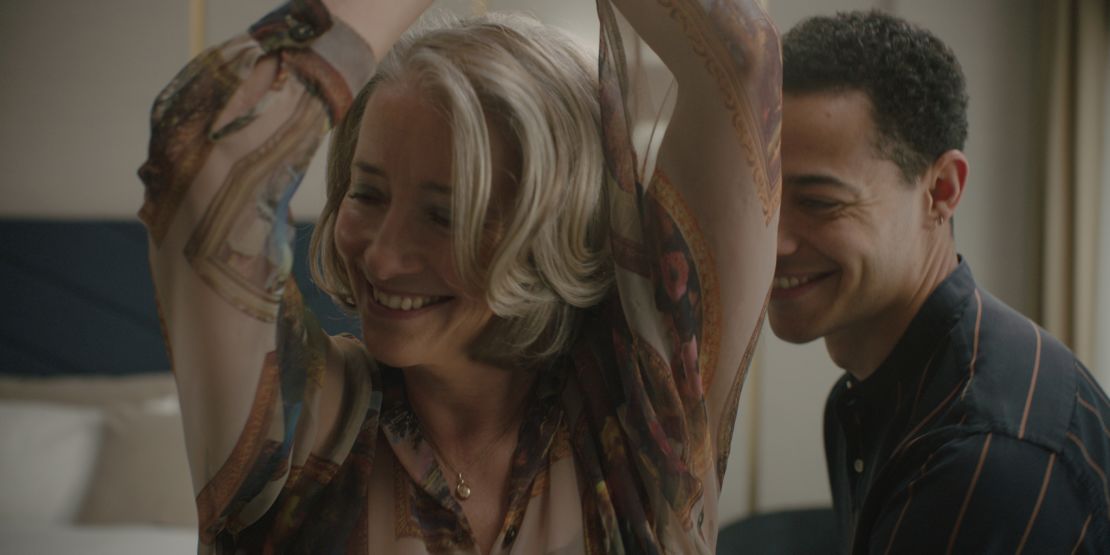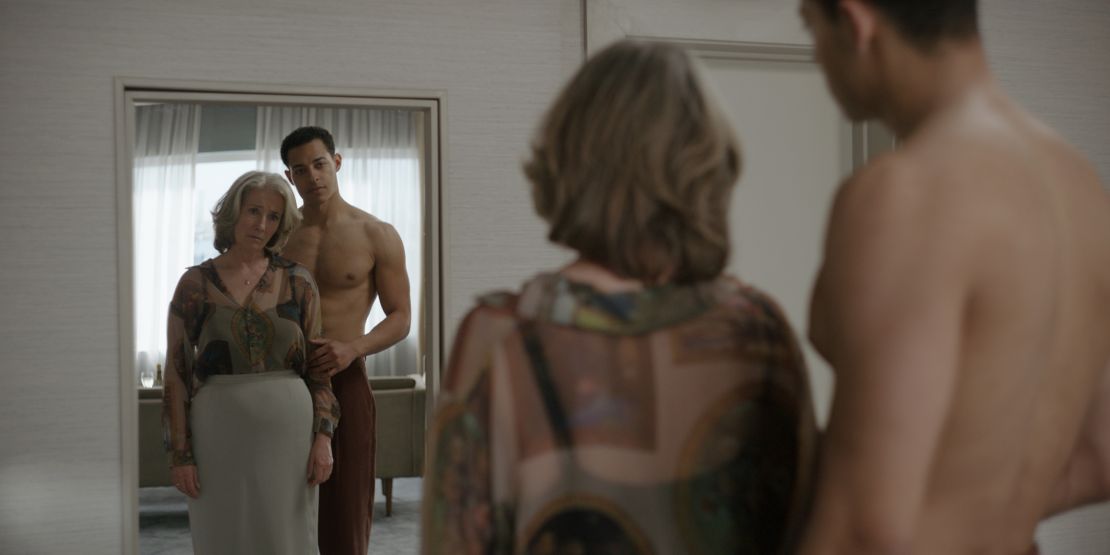Editor’s Note: Sara Stewart is a film and culture writer who lives in western Pennsylvania. The views expressed here are solely the author’s own. View more opinion articles on CNN.
If you wrote up a list of buzzwords to infuriate the cult of online misogyny, you’d likely find all of them in the delightful “Good Luck to You, Leo Grande.” The new Hulu film stars Emma Thompson as Nancy, a retired schoolteacher and widow who hires a much-younger sex worker (Daryl McCormack) for a series of encounters in a hotel room. She’s looking to sleep with someone other than her husband, who was her only partner; more crucially, she’s interested in enjoying sex for the first time in her life.

The female-written and directed dramedy is a marvel, and a rarity. Its gentle honesty about the wide spectrum of human sexuality stands in direct opposition to so much of what we see depicted in movies as “normal” sex – particularly women’s experience of it. And the movie’s attitude toward sex work – that this profession might actually offer a valuable service to humanity - is downright radical for Hollywood. That director Sophie Hyde, Thompson and newcomer McCormack deliver all of this with such a light touch is nothing short of masterful.
“Leo Grande” is one of two-time Oscar winner Emma Thompson’s best-ever roles, and that’s saying something. The 63-year-old has also long been one of the leading voices in openly discussing sexism in the entertainment industry. Several years ago, she called B.S. on the oft-cited notion that things were getting better for female actors: “I don’t think there’s any appreciable improvement and I think that, for women, the question of how they are supposed to look is worse than it was even when I was young…So, no, I am not impressed, at all. I think it’s still completely s**t, actually.”
The messaging in most female roles – that women should constantly be policing the aesthetics of their bodies, apprehensive about sex and ashamed of or embarrassed by their own desires – is cleverly embedded in Nancy’s dialogue. Thompson performs comedic self-doubt like no one else, but here it’s with a deep undertone of sadness that she embodies Nancy’s internal war between wanting to broaden (or indeed, invent) her sexual horizons, and her decades-long belief that to want to do so is shameful and at her age, humiliating for everyone involved.

I’ve been writing about movies for quite a while and one aspect of film that has remained maddeningly constant – with a handful of exceptions – is the howlingly stupid portrayal of women’s sexual pleasure. It is something I have learned not to comment on every single time I write about a movie with heterosexual sex in it, lest I become a broken record (and a middle-aged female one at that), but can we talk about it? For just a minute?
9.5 times out of 10, when a man and a woman have sex in the movies, it’s brief, it’s missionary (i.e. he’s on top) and they climax together, gorgeously. This spectacle is, in fact, a lot like the sex Nancy tragi-comically describes to Leo, minus the artistry and the mutual enjoyment: As she recalls, her husband would climb on top of her, pump away, have an orgasm, roll off and go to sleep.
She, meanwhile, has never had an orgasm, ever, she tells Leo. Which puts her solidly in the majority of women, per one study, who don’t have orgasms without clitoral stimulation. Yet somehow, it seems like the bulk of the representation of male-female sex in mainstream movies (plus a good chunk of adult films) present women’s orgasms as something that just magically happen at the very moment it’s most cinematic.

Forget about finding women over 60 having their desires discussed and depicted onscreen – or sex work portrayed in ways that aren’t sensationalized or damning. The only movie I can recall that approaches a “Leo Grande” level of respect for sex work as a humane profession is a decade old: Ben Lewin’s “The Sessions,” which featured Helen Hunt as a sex surrogate working with a profoundly disabled man (John Hawkes) who’s interested in experiencing sexual intimacy for the first time.
“Leo Grande” doesn’t sugarcoat the realities of sex work, particularly for women, but its unapologetically heroic portrayal of Leo claps back at the still-prevalent idea that anyone who goes into the field must be deeply damaged. As one reproductive justice advocate writes, “the idea of purchasing intimacy and paying for the services can be affirming for many people who need human connection, friendship, and emotional support. Some people may have fantasies and kink preferences that they are able to fulfill with the services of a sex worker.”
In one of the movie’s most moving monologues – and it really does feel like a stage play – Leo describes to Nancy some of his regular clients, including one who just wants to hold hands and watch TV and another who is physically disabled and likes dirty talk and co-bathing. Which, Leo adds, he finds hot (an endorsement that’s echoed bodily, as Nancy raises her eyebrows with a glance at his groin).
In a recent Vogue essay, Thompson discussed why this aspect of the film appealed to her so much: “Sexual assistance – why isn’t it on the National Health Service? Sex is free, natural, normal, delightful, good for us, and, as Leo says in the film, inaccessible to some for all kinds of perfectly valid reasons. It’s a public health issue.” McCormack’s character, she adds, “understands that he can make people feel better, he can improve their lives, and sometimes he can even release them from suffering. He teaches Nancy, in short, about the possible sanctity of sex work.”
Talk about a message at odds with our current political moment, where women’s bodily autonomy and power are under siege.
In a recent interview with Stephen Colbert, Thompson said, “It’s not a romantic story, and that’s what I think is radical about it.” Indeed, a plot about an older woman taking her sex life into her own hands and not needing to attach sentimentality to it is romance-defying, as we know the genre to be.
But I’d argue “Leo Grande” is a romance, in a way we’re not used to thinking of it: One between Nancy and her own body. Thompson gets unabashedly naked at one point – no gauzy lighting, no flattering poses – and told Colbert that, in doing so, she had “taken sort of a leap of faith and had placed my faith in the audience.”
I hope they prove themselves worthy of it, and of her.

